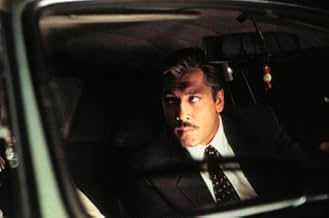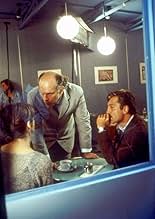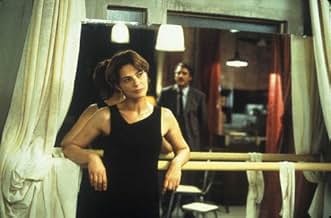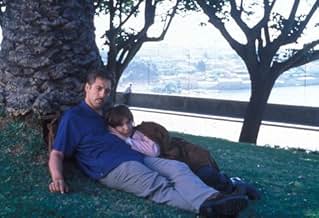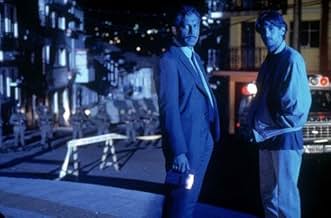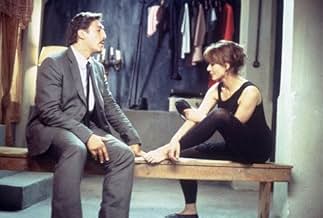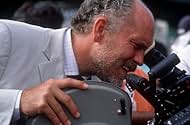IMDb-BEWERTUNG
6,8/10
7125
IHRE BEWERTUNG
Füge eine Handlung in deiner Sprache hinzuA police detective in a South American country is dedicated to hunting down a revolutionary guerilla leader.A police detective in a South American country is dedicated to hunting down a revolutionary guerilla leader.A police detective in a South American country is dedicated to hunting down a revolutionary guerilla leader.
- Auszeichnungen
- 1 Gewinn & 3 Nominierungen insgesamt
Empfohlene Bewertungen
Having seen "Being John Malkovich" recently, I expected a lot from "The Dancer Upstairs" and I have to admit that I really was enchanted by it. Even though it never says which country in South America this story is based on, it's clear that it must be Peru. There just are too many references to the rebel movement The Shining Path, president Fujimori... But it's good that it never says that it is actually Peru. There are more South American dictatorships, more rebel movements...
It tells the story of an ex-lawyer who has become police officer, because he wanted justice to be done in the right way. He has to hunt down and arrest a revolutionary guerilla leader, but as he digs deeper, he'll find out that more people are actually supporting the rebels than he thought, even the people that he never suspected...
What I liked so much about the movie is the way it portrays everything. It doesn't fear to show the violence committed by both sides, but also shows the beautiful side of the country (its landscapes, its culture,...). Some say this is clearly a right-wing movie and that Malkovich is right wing as well. What has the political preference of the director to do with it? This movie isn't right-wing, nor is it left-wing. It clearly shows both sides, giving you the police detective who works for the right-wing government, who falls in love with the left-wing activist.
If there is one remark that I have to make, than it must be the fact that the actors didn't speak in Spanish. Now they had some weird Spanish-English accent. But all the rest was really very good. I give it an 8.5/10.
It tells the story of an ex-lawyer who has become police officer, because he wanted justice to be done in the right way. He has to hunt down and arrest a revolutionary guerilla leader, but as he digs deeper, he'll find out that more people are actually supporting the rebels than he thought, even the people that he never suspected...
What I liked so much about the movie is the way it portrays everything. It doesn't fear to show the violence committed by both sides, but also shows the beautiful side of the country (its landscapes, its culture,...). Some say this is clearly a right-wing movie and that Malkovich is right wing as well. What has the political preference of the director to do with it? This movie isn't right-wing, nor is it left-wing. It clearly shows both sides, giving you the police detective who works for the right-wing government, who falls in love with the left-wing activist.
If there is one remark that I have to make, than it must be the fact that the actors didn't speak in Spanish. Now they had some weird Spanish-English accent. But all the rest was really very good. I give it an 8.5/10.
Very closely based on Guzman and the Shining Path Maoist terrorists in Peru, this movie is compulsive viewing.
The plot is fairly standard good cop tracks down bad guys - there are no bonus points for this plot. Indeed, some of the coincidences that arise as the film goes on are the weakest link in this otherwise near-flawless movie.
There has been much talk about the violent scenes in this movie, which are many, but especially the scenes with animals. My view is that it is no more morally wrong to depict violence to animals than it is to depict violence to humans, as long as no animal (or human) is actually harmed in making the depiction. We are told that none of the animals were harmed in the making of the film (and presumably also none of the people). As far as I am concerned that is the end of that matter - the use of animals, unhamred, for this purpose is acceptable. To argue otherwise I find, frankly, daft. However, I would recommend that people who get particularly upset when violence to animals is depicted should simply avoid this movie.
Back to the movie - the acting and the cinematography are superb. It is gripping - the film is 135 minutes long which is well past my attention span unless the film is really good. This film is just that.
The plot is fairly standard good cop tracks down bad guys - there are no bonus points for this plot. Indeed, some of the coincidences that arise as the film goes on are the weakest link in this otherwise near-flawless movie.
There has been much talk about the violent scenes in this movie, which are many, but especially the scenes with animals. My view is that it is no more morally wrong to depict violence to animals than it is to depict violence to humans, as long as no animal (or human) is actually harmed in making the depiction. We are told that none of the animals were harmed in the making of the film (and presumably also none of the people). As far as I am concerned that is the end of that matter - the use of animals, unhamred, for this purpose is acceptable. To argue otherwise I find, frankly, daft. However, I would recommend that people who get particularly upset when violence to animals is depicted should simply avoid this movie.
Back to the movie - the acting and the cinematography are superb. It is gripping - the film is 135 minutes long which is well past my attention span unless the film is really good. This film is just that.
The film's trailer, which rain endlessly for months in advance at my local art house, and the reviews, etc., have emphasized this as a political thriller. But in fact it's really in the tradition of "Casablanca," where politics is a constant background to only part of the hero's motivation. I did expect someone to say "Round up the usual suspects!"
Awkwardly in this day and age, the Latino actors in the film's unnamed Latin American country (it was filmed in Ecuador and Madrid) all speak (accented) English, with subtitles to indicate when characters are speaking an Indian dialect, i.e. when the hero lawyer/detective is using his heritage to solve the complex case of politically-motivated murders.
But it's the complex layers that make this more interesting than Costa-Gavras' didactic "State of Siege" that is repeatedly referred to as an inspiration, both to director John Malkovich and the revolutionaries, and making this akin to HBO's "The Wire" in showing how a flawed cop can stick to his professionalism amidst deadly-serious bureaucratic and real politics.
The cop's simplistically drawn Beverly Hills matron-type wife turns out to incidentally help him uncover a clue, as he gradually comprehends the cynicism of a revolution that uses unexpected types of cells for suicide missions, with resonance for the MidEast as well, as ideologues are more diabolically dangerous than criminals.
That the dancer is actually downstairs is emblematic of the film's genre confusion.
Awkwardly in this day and age, the Latino actors in the film's unnamed Latin American country (it was filmed in Ecuador and Madrid) all speak (accented) English, with subtitles to indicate when characters are speaking an Indian dialect, i.e. when the hero lawyer/detective is using his heritage to solve the complex case of politically-motivated murders.
But it's the complex layers that make this more interesting than Costa-Gavras' didactic "State of Siege" that is repeatedly referred to as an inspiration, both to director John Malkovich and the revolutionaries, and making this akin to HBO's "The Wire" in showing how a flawed cop can stick to his professionalism amidst deadly-serious bureaucratic and real politics.
The cop's simplistically drawn Beverly Hills matron-type wife turns out to incidentally help him uncover a clue, as he gradually comprehends the cynicism of a revolution that uses unexpected types of cells for suicide missions, with resonance for the MidEast as well, as ideologues are more diabolically dangerous than criminals.
That the dancer is actually downstairs is emblematic of the film's genre confusion.
Actor John Malkovich makes an auspicious directorial debut with `The Dancer Upstairs,' an intriguing, if not altogether satisfying, police procedural set in an unnamed Latin American country.
Javier Bardem (`Night Must Fall') gives a richly textured performance as Detective Augustin Rejas, a man of principle and ethics operating in a world of corruption and violence. Rejas finds himself embroiled in a life-and-death mystery when he investigates an underground terrorist organization that is targeting key government officials for assassination. Who these people are is not at all clear to those in charge and even their motives can only be guessed at. As Rejas studies the clues in search of answers, he becomes drawn to a beautiful young dance teacher with whom he establishes a platonic yet highly charged romantic relationship. It is in the bringing together of these two seemingly disparate plot lines that the movie fails, ultimately, to satisfy. For roughly the first three quarters of the film, as Rejas collects his evidence and unravels the puzzle, we gladly go along where the filmmakers are taking us, fascinated by the setting, the atmosphere and the contemporary relevance of the terrorism theme. But when, towards the end, the story kicks into high tragedy mode, the movie loses us, partly because the plotting itself is not particularly credible and partly because the relationship between Rejas and the woman has not been sufficiently developed to achieve the status of genuine tragedy. The film is much better when it sticks to the business of the case and leaves all the existential navel-gazing out of the mix.
This is not to demean either the moving, beautifully modulated performance of Bardem or the stark, self-assured direction of Malkovich, who shows he knows how to function as well behind the camera as he does in front. True, the film is a trifle slow at times but this just shows that Malkovich will not be rushed when the material itself demands deliberation and care. Although the movie is about a half hour too long, real languor begins to set in only during the final stretches. Until then, `The Dancer Upstairs' makes for rewarding viewing.
Javier Bardem (`Night Must Fall') gives a richly textured performance as Detective Augustin Rejas, a man of principle and ethics operating in a world of corruption and violence. Rejas finds himself embroiled in a life-and-death mystery when he investigates an underground terrorist organization that is targeting key government officials for assassination. Who these people are is not at all clear to those in charge and even their motives can only be guessed at. As Rejas studies the clues in search of answers, he becomes drawn to a beautiful young dance teacher with whom he establishes a platonic yet highly charged romantic relationship. It is in the bringing together of these two seemingly disparate plot lines that the movie fails, ultimately, to satisfy. For roughly the first three quarters of the film, as Rejas collects his evidence and unravels the puzzle, we gladly go along where the filmmakers are taking us, fascinated by the setting, the atmosphere and the contemporary relevance of the terrorism theme. But when, towards the end, the story kicks into high tragedy mode, the movie loses us, partly because the plotting itself is not particularly credible and partly because the relationship between Rejas and the woman has not been sufficiently developed to achieve the status of genuine tragedy. The film is much better when it sticks to the business of the case and leaves all the existential navel-gazing out of the mix.
This is not to demean either the moving, beautifully modulated performance of Bardem or the stark, self-assured direction of Malkovich, who shows he knows how to function as well behind the camera as he does in front. True, the film is a trifle slow at times but this just shows that Malkovich will not be rushed when the material itself demands deliberation and care. Although the movie is about a half hour too long, real languor begins to set in only during the final stretches. Until then, `The Dancer Upstairs' makes for rewarding viewing.
It's Latin America in the Recent Past. Agustín Rejas (Javier Bardem) is a Sergeant manning a road check. The country is corrupt with a militaristic Presidency. Rejas is a former lawyer ready for a promotion in the capital. A mysterious man with others and a dead dog in a truck escape the checkpoint. Then it's five years later. He's a police Lieutenant. With his young partner Sucre (Juan Diego Botto), he's investigating a mysterious revolutionary group led by Ezequiel. They hang dogs from the lamp posts. The violence escalates as leaders get assassinated. Yolanda (Laura Morante) is Rejas' daughter Laura's dance teacher. He begins an affair with her as he suspects her connection to Ezequiel.
The non-specificity of the time and place could have been improved by weaving the real story into this movie. It doesn't have to be perfect and most movies aren't real biographies anyways. The great aspect of this is Bardem and the sense of Latin America that this projects. John Malkovich is directing for the first time and he shows some competency. It is well-made and most importantly, he focuses on Bardem. The story does leave some questions. The ballet teacher's connections to everyone is very convenient. The investigation is not that clear. I don't know how nebulous the book is but adapting may have left something out of the movie. It would help to have great clarity, and better intensity.
The non-specificity of the time and place could have been improved by weaving the real story into this movie. It doesn't have to be perfect and most movies aren't real biographies anyways. The great aspect of this is Bardem and the sense of Latin America that this projects. John Malkovich is directing for the first time and he shows some competency. It is well-made and most importantly, he focuses on Bardem. The story does leave some questions. The ballet teacher's connections to everyone is very convenient. The investigation is not that clear. I don't know how nebulous the book is but adapting may have left something out of the movie. It would help to have great clarity, and better intensity.
Wusstest du schon
- WissenswertesThe story is inspired by the Maoist insurgency in Peru known as the Shining Path. Its leader Abimael Guzmán, who was known by the nom de guerre President Gonzalo, was captured in an apartment above a ballet studio in the capital city of Lima in 1992. The ballet teacher Yolanda was based on Maritza Garrido Lecca, the woman in whose apartment Guzmán was found. Bardem's character was inspired by Benedicto Jimenez and Gen. Antonio Ketin Vidal, the leading figures responsible for Guzmán's capture.
- PatzerWhen Sucre & Llosa arrest the young woman in orange, she has been handcuffed to the ceiling of the car. But then en route, soldiers simply drag her out of the backseat. No handcuff keys. No bolt cutters.
- Zitate
Agustín Rejas: I'd like to have a list of staff with access to the President's chambers.
Calderón: Luckily there are only two of them. The first is named 'Fuck', the second is named 'Off'.
- Crazy CreditsThe producers would like to thank ... the residents of Narcisos Street ...
- VerbindungenFeatured in Revealing 'The Dancer Upstairs' (2003)
- SoundtracksViagens Interditas
(1995)
Written by Pedro Malgheas (as Pedro Ayres) and Rodrigo Leão
Performed by Madredeus
Licensed by Dpte. de Productos Especiales de
(p) EMI Odean, S.A., Madrid, Spain, 2001 exclusive rights holder
Top-Auswahl
Melde dich zum Bewerten an und greife auf die Watchlist für personalisierte Empfehlungen zu.
- How long is The Dancer Upstairs?Powered by Alexa
Details
Box Office
- Bruttoertrag in den USA und Kanada
- 2.377.348 $
- Eröffnungswochenende in den USA und in Kanada
- 106.142 $
- 4. Mai 2003
- Weltweiter Bruttoertrag
- 5.227.348 $
- Laufzeit2 Stunden 12 Minuten
- Farbe
- Sound-Mix
- Seitenverhältnis
- 1.85 : 1
Zu dieser Seite beitragen
Bearbeitung vorschlagen oder fehlenden Inhalt hinzufügen

Oberste Lücke
By what name was Der Obrist und die Tänzerin (2002) officially released in Canada in English?
Antwort


